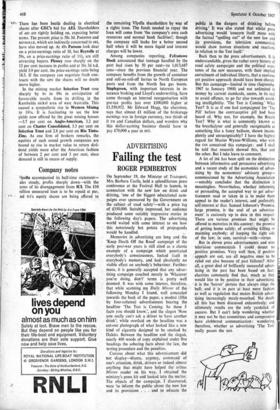Failing the test
ADVERTISING ROGER PEMBERTON
On September 19, the Minister of Transport, Mrs Barbara Castle, held a splendiferous press conference at the Festival Hall to launch, in connection with the new law on drink and driving, 'one of the biggest educational cam- paigns ever sponsored by the GoVernment on the subject of road safety'—with a price tag of £350,000. Suitably impressed, her audience produced some suitably impressive stories in the following day's ,papers. The advertising world waited with some interest to see how this notoriously hot potato of propaganda would be handled.
Memories in 'advertising are long and the `Keep Death Off the Road' campaign of the early post-war years is still cited as a- classic example of a campaign which penetrated everybody's consciousness, locked itself in everybody's memory, and had. absolutely no visible effect on anybody's behaviour. Further- more, it is generally accepted that any adver- tising campaign couched merely in 'Whatever you're doing, don't' terms, is pretty well doomed. It was with some .interest, therefore, that while scanning my Daily Mirror of the following Monday I found, well concealed towards the back of the paper, a modest (10in by four-column) advertisement bearing the headline 'The Test is Coming. So these 5 facts you should know.', and the slogan 'Now you really can't ask a driver to have another drink'; while overlaid on the headline was a cut-out photograph of what looked like a new kind of cigarette designed to be smoked by Daleks. Between the headline and the slogan, nearly 400 words of copy explained under five headings the sobering facts about the law, the testing procedure and the penalties.
Curious about what this advertisement did not display—drama, urgency, command of one's attention, drink, drivers or indeed almost anything that might have helped the artless Mirror reader on his way, I obtained the ministry's press kit and looked into the matter. The objects of the campaign, I discovered, were 'to inform the public- about the new law and its provisions . . . and to educate the public in the dangers of drinking before driving.' It was also stated that whilst press advertising would 'concern itself more with the factual "spelling out" of the new law and its provisions, the television commercials would show human situations and reactions in relation to the Test itself.'
Back then to the press advertisements. It is understandable, given the rather sorry history of road safety campaigns and the political over- tones of the new measures, with their implied curtailment of individual liberty, that a cautious yet positive approach should have been chosen. But this campaign—limited in time (September 1967 to January 1968) and not unlimited in money by current standards, seems, in its zeal to avoid offence, to go far also towards avoid- ing intelligibility. 'The Test is Coming.' What Test? It is as if one had campaigned for The Pill' before the contraceptive pill_ had been heard of. Why not, for example, the Breath Test? Why is what is commonly known as the breathalyser and generally recognisable as something like a fancy balloon, shown incom- pletely and unrecognisably? I have the highest regard for Masius Wynne-Williams, who with the cot conceived this campaign: and I shall be told that research showed this, that and the other. But I take leave to comment.
A lot of ink has been spilt on the distinction between informative and persuasive advertising and a recent study of the economics of adver- tising by the economists' advisory group—. commissioned by the Advertising Association —sensibly concludes that the distinction is meaningless. Nevertheless, whether informing or persuading, the accepted way to get adver- tisements read or taken in is to make them appeal to the reader's interest, and preferably self-interest at that. Samuel Johnson's 'Promise, large promise, is the soul of an advertise- ment' is curiously up to date in this respect. There are various promises that might be offered to motorists in this context : the promise of getting home safely; of avoiding killing or maiming anybody; of keeping the right side of the law; in sum, survival—with—virtue.
But in eleven press advertisements and nine television commercials I could detect no positive promises. Very well then, if positive appeals are out, are all negative ones to be ruled out also because of_past failures? After all, a -great deal of brilliantly successful adver- tising in the past has been based on fear; charities commonly find that, much as they would like to be positive in their advertising, it is the 'horror' picture that always rings the bell; and it is in part at least mere fashion as well as regulation that makes British adver- tising increasingly mealy-mouthed. No doubt all this has been discussed exhaustively; and ultimately results are the only yardstick of success. But I can't help wondering whether it may not be that committees and compromise have clobbered communication: wondering, therefore, whether as advertising 'The Test' really passes the test.


































 Previous page
Previous page